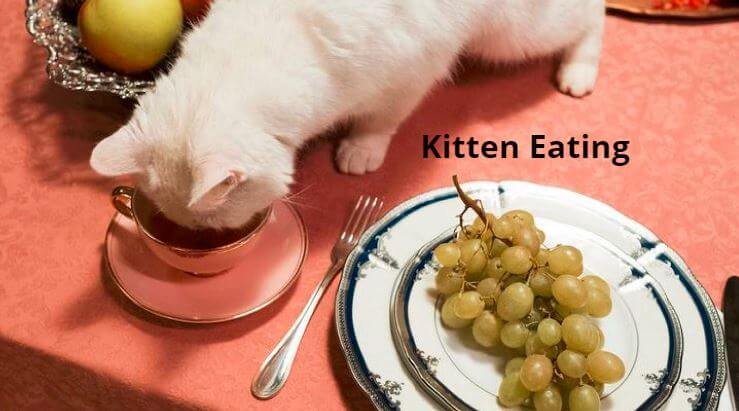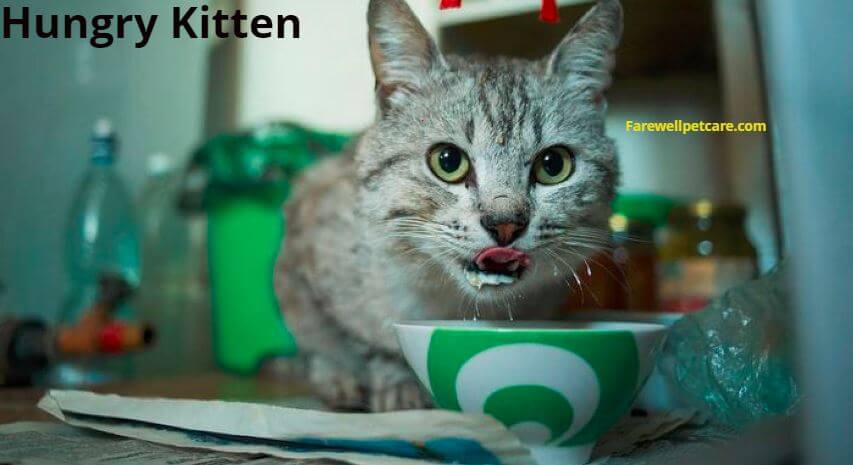Do you ever feel like your kitten is hungry all the time? You make sure to fill up the food bowl with ample amounts of fresh, nutritious wet and dry foods, but as soon as it’s finished, the kitten acts as if it hasn’t been fed in days. This situation has left many feline owners wondering, “Why is my kitten so hungry all the time?”
Your kitten is so hungry all the time due to the rapid growth spurts that need a frequent energy supply. Moreover, kittens play a lot to learn essential cat skills for communication and hunting. Therefore, they need more energy to sustain these vigorous activities, hence the frequent hunger and excessive eating.
Keep reading as we dive deeper into the reasons why our kitties appear hungry all the time. Besides understanding our cats, we explore how you can help your kitten with never-ending food cravings.
Reasons Your Kitten Is So Hungry All the Time

If you’re like most feline parents, the amount of food your fur baby consumes is always a concern. You want to ensure your kitten is never overfed to prevent obesity which can cause diabetes and other lifestyle diseases. Therefore, it’s normal to get alarmed when you realize your kitten is hungry and wants to eat all the time.
The following are the main causes of kittens feeling hungry all the time:
1. Growth Spurts
Just like human babies, kittens go through growth spurts to attain the beautiful outlook of an adult cat.
It’s worth mentioning that kittens are born deaf and blind. Thus, their bodies start transforming early to survive normally, like adult cats. Among the initial transformations is the opening of the eyes and ears.
During the transformation period, your kitten needs more energy for development and growth. To fulfill her increased energy needs, the kitten will be hungrier than usual and will eat more food than an adult cat.
The amount of food your kitten consumes varies based on its growth stage. The following section discusses the kitten growth cycle to help you understand why your kitten’s eating habits keep changing.
- Week one: The kitten is close to the mother and concentrates on sleeping and eating. You don’t have to worry much about feeding the kitten at this time, as the mother cat is in control. The eyes and ears start opening at the end of the first week.
- Four to six weeks: The mother cat starts weaning her kittens. The kittens start growing baby teeth and can slowly begin eating solid foods. The teeth marks the genesis of a new growth spurt as they learn how to eat and engage with littermates. Although you’ll notice a heightened activity level among the kittens, they are still young to consume more food. They’re not yet so hungry at this time.
- Four to six months: The kitties begin lengthening and bulking up. Moreover, they will shed their baby teeth and grow adult ones. At this time, you’ll notice that the kitten is so hungry all the time. The lengthening and bulking process requires more energy, so the kitty feels so hungry most of the time. It’s recommended to feed your kitten at least three meals daily during this growth spurt period.
- Adolescence (six months to one year): Although their growth rate is reduced during adolescence, kittens still need more food than adult cats. During this period, the kitty develops a spurt of teenage behavior. If not neutered or spayed, the kitten will exhibit annoying behavior due to the heat period and the extra energy they gain by eating too much food.
- Adult Cat (one year and above): Your cat has attained full growth and no longer requires so much energy like before. Therefore, you can reduce the number of meals from three to two a day and provide a healthy and balanced diet for the cat.
2. Activity/Playing
Kittens love indoor and outdoor playing as part of their exploration instinct and learning essential cat skills. After making a few jumps, the kitty will want to replenish its energy levels with food and can be ravenous.
More often than not, kittens engage in play activities with their littermates to learn survival tactics. They need to know hunting tactics after being weaned to get their own food.
An energetic and active kitten expends approximately 43 calories daily (15% difference) compared to a sedentary one. As the kitten burns these calories, it will be hungrier than usual and want more food.
It’s essential to give your kitten a balanced diet that can supplement its energy needs during playtime or any other activity. The meals must contain proteins, carbs, and vitamins, among other nutrients that give the kitty the necessary energy.
Find Out: How to Comfort a Dying cat in 6 Simple Ways
3. Metabolic Rate
The metabolic rate entails energy expenditure per unit of time when the kitten is at rest.
Like humans, cats have a metabolic rate that determines their energy requirements for growth and proper functioning of their bodies. Kittens have a higher metabolic rate than adult cats. As a result, they require more energy for their growth and development.
Since food is the main source of energy, the kitten will be so hungry all the time. As the parent, you must keep feeding your fur baby to sustain these energy requirements.
4. Intestinal Parasites
If your kitten is hungry all the time, it could be a sign that is it hosting a parasite.
Excessive hunger is one of the symptoms of intestinal parasites in humans. The same is true for your kitten.
Intestinal parasites cause excessive hunger and increased appetite in cats which can easily lead to overeating and being overweight.
Intestinal parasites like roundworms and tapeworms are among the culprits of increased hunger in kittens. These parasites ingest most of the calories you feed your kitten, leaving it hungry.
A kitten infested by intestinal parasites will always feel hungry even if you feed her frequently.
If you feel that your kitten is hungry all the time, getting a diagnostic test and deworming your kitten are the best remedies for this problem. However, you must confirm if your fur baby has intestinal parasites before deworming her. Besides being hungry all the time, other symptoms that your kitten has intestinal parasites include:
- Loss of appetite
- Vomiting or diarrhea
- Dehydration
- Pale mucous membranes
- A dull coat
- A pot-bellied appearance
It’s important to visit the vet as soon as you notice any of these symptoms in your kitten. The vet will advise you on the best way to eliminate the worms from your pet’s body.
5. Health Issues

Your kitten may feel hungry all the time due to some underlying health issues. For example, your kitty may have an infection or a thyroid disorder like hypothyroidism that causes her to feel hungrier than normal.
Other health problems that may be the cause behind your kitten being hungry all the time are;
- Diabetes mellitus: This is a condition caused by inadequate insulin production or poor response to insulin by the kitty’s body. Your kitten might have this condition if it drinks excessive water and urinates frequently.
- Cancer: Intestinal and systemic cancers are among the causes of increased appetite in cats.
You should consult a vet for proper diagnosis and treatment if your kitten has been eating more but not gaining weight despite the increased appetite.
Should I Let My Kitten Eat as Much as It Wants?
You should let your kitten eat as much as it wants without worrying about it becoming overweight. Kittens need many calories to sustain their growth spurts and heightened activity level. Therefore, since most of the energy consumed is used quickly, feeding your kitty as much as it wants won’t make it overweight.
As long as you provide a balanced diet and exercise routine for your kitten, letting her eat as much as she wants should not be a problem.
Now that it’s safe to feed your kitten as much as it wants, does it mean feeding it any available food? Absolutely no. You must stick to a kitten’s nutritional requirements for healthy growth.
You must prioritize the following nutrients in your kitten’s diet:
- Protein: 35-50% based on dry matter. At least 9% of the dry matter should be from an animal source.
- Fat: 18-35%
- Calcium: 0.8-1.6% based on dry matter.
In addition to the above nutrients, you should ensure the kitten gets sufficient amino acids.
Is It Possible to Overfeed a Kitten?
It’s possible to overfeed a kitten if you indulge in free-feeding practices. Free-choice feeding entails feeling the kitten’s bowl and leaving it for the kitty to eat as much as it wants. While this may seem welcome since the kitten wants more energy, it can lead to overfeeding and obesity.
To avoid overfeeding your kitten, practice portion control feeding. This means feeding the kitten in a scheduled pattern rather than leaving food available at all times.
A rule of thumb is to feed the kitten small amounts of wet food three to five times a day. You can gradually reduce the feeding schedule once the kitten is six months old.
This also helps promote good eating habits and reduces the chances of overeating. Most importantly, it gives you more control over the kitten’s food intake and helps it avoid getting overweight.
What to Do If Your Kitten Is So Hungry All the Time
Now that you know why your kitten is so hungry all the time, it’s time to look at what you can do to remedy the situation.
The main thing to do is to identify whether your kitty’s heightened appetite results from growth spurts, health issues, or intestinal parasites.
Visit your veterinarian to get a proper diagnosis. If the vet verifies that the kitten is healthy, you should explore ways to satiate its hunger without making it overweight.
Otherwise, if the vet finds intestinal parasites or other health issues, you should follow the treatment plan for the underlying condition. This will help restore the kitty’s normal eating patterns.
Final Thoughts
Why is my kitten so hungry all the time? The reasons why your kitty may be so hungry all the time could range from metabolic rate to health issues. Before proceeding with diagnostics or treatment, you need to note other symptoms of diseases or intestinal parasites. If you feel like your kitten is hungry even after feeding , the vet will advise you on what steps to take after examining your kitten for excessive hunger.
FAQs
Why Does My Kitten Always Act Like He’s Starving?
If your kitten always acts like he’s starving even after eating, it indicates a myriad of possibilities, including boredom, a need for more calories, or an underlying medical condition. Some of the medical conditions that can make your kitten to always act like he’s starving include diabetes mellitus, internal parasites, and hyperthyroidism.
why does my kitten act like it is starving?
Your kitten may be exhibiting signs of boredom, a medical issue, or a need for more calories if he consistently acts as though he is famished even after eating. Among the illnesses that might cause your cat to constantly act as though he is famished are hyperthyroidism, internal parasites, and diabetes mellitus.
do kittens eat a lot?
Your kitten needs more energy for development and growth. To fulfil her increased energy needs, the kitten will be hungrier than usual and will eat more food than an adult cat.
So if you see your kitten a lot, be assured that it is normal and good for her development.

